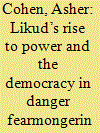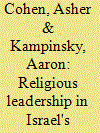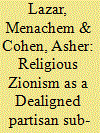| Srl | Item |
| 1 |
ID:
086222


|
|
|
|
|
| Publication |
2009.
|
| Summary/Abstract |
From Hegel to Sartre to Levinas, the 'Other' has populated the pages of philosophy. Gender studies has enlisted the term to denote the manner in which male-dominated culture relates to women. Perhaps most commonly-with Edward Said leading the way-the 'Other' has taken on the meaning of the colonized, the inferior and the alien. The 'Other' has taken its place alongside 'narrative', 'paradigm', 'discourse', multi- and post-most-anything in the de rigueur vocabulary of contemporary social science.
In its common academic sense, 'Others' refer to specific collectives whose characters are clear and delimited-women, homosexuals, ethnic minorities and so on. Being an 'Other' in today's sociological discourse entails belonging to a group with unmistakable traits, a group whose distinct character is the source of the prejudicial treatment it suffers.
|
|
|
|
|
|
|
|
|
|
|
|
|
|
|
|
| 2 |
ID:
163293


|
|
|
|
|
| Summary/Abstract |
The 1977 elections in Israel marked the first time since the country’s establishment in 1948 for a right-wing government to be elected. Immediately after this sea change, a ‘Democracy in Danger’ fearmongering discourse was instituted by representatives of academic, cultural, political and media elites. In fact, as this article shows, Likud’s ascendance served as a formative event of democratic transformation in the deepest sense of the word, strengthening and deepening Israel’s democratic identity that had hitherto been limited at most.
|
|
|
|
|
|
|
|
|
|
|
|
|
|
|
|
| 3 |
ID:
073697


|
|
|
| 4 |
ID:
078594


|
|
|
| 5 |
ID:
187561


|
|
|
|
|
| Summary/Abstract |
During the second decade of the twenty-first century, Israel’s Religious Zionist camp has undergone a process of accelerated Dealignment of its partisan system, resulting in the transformation of the political parties comprising it into a Dealigned Partisan Subsystem. An example of this process can be found in the transformations that took place in the ‘Jewish Home’ Religious-Zionist political party led by Naftali Bennett. Within 9 years and seven election campaigns, the party succeeded in trying out the Open Camp Party model, experiencing a division led by Bennett himself, and finally reaching the verge of disappearing and once again initiating renewed revival attempts. The Dealignment of partisan systems includes a high level of voters’ mobility; a decline in the support of existing mainstream parties; a decline in voting rates; and a decline in the strength of partisan identification, while voting patterns become more personal. The partisan system itself changes during this stage, with old parties disappearing and others rising in their place, often only to disappear from the political map as quickly as they appeared. This article illustrates the extent to which the Religious-Zionist partisan subsystem in Israeli politics during the second decade of the twenty-first century until the 2022 elections campaign corresponds with most characteristics of a Dealigned system.
|
|
|
|
|
|
|
|
|
|
|
|
|
|
|
|
| 6 |
ID:
093900


|
|
|
|
|
| Publication |
2010.
|
| Summary/Abstract |
This study examines the respective performances of the various religious parties in the 2009 election. It concludes that while the ultra-Orthodox (Haredi) parties broadly maintained their electoral strength, the national religious parties were rocked by debilitating conflicts, ideological splits and intra-institutional fractures which resulted in a substantial decrease in their Knesset representation.
|
|
|
|
|
|
|
|
|
|
|
|
|
|
|
|